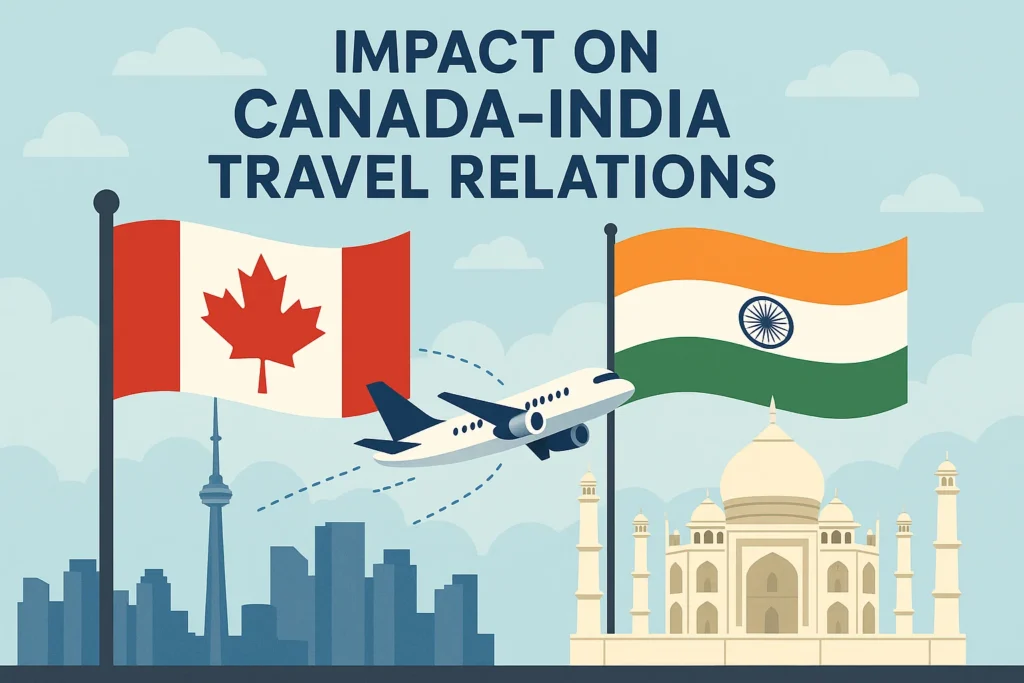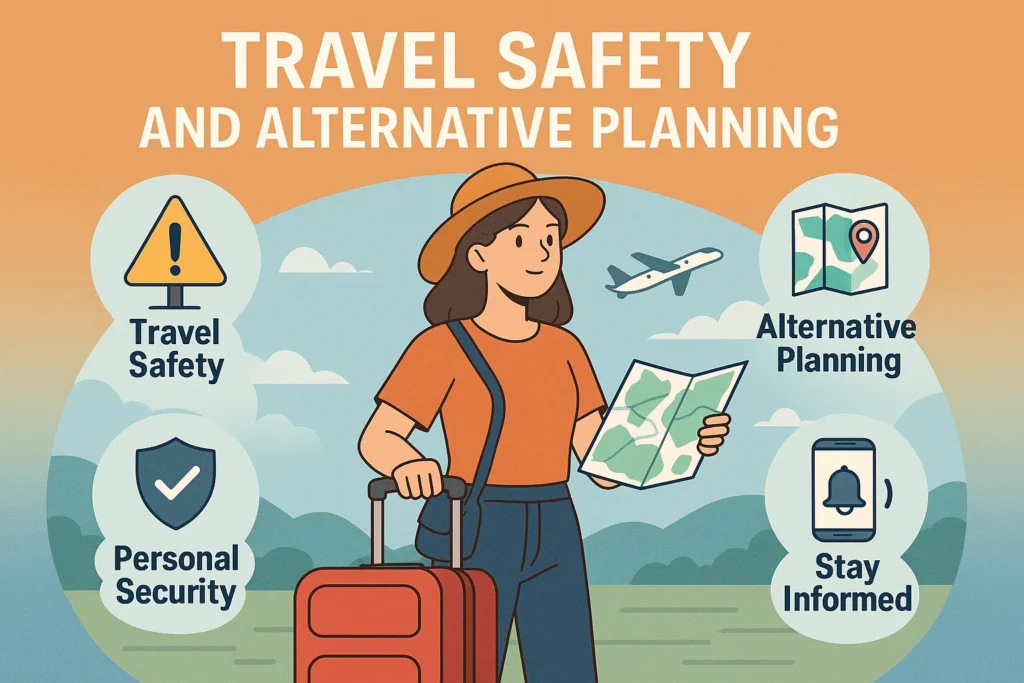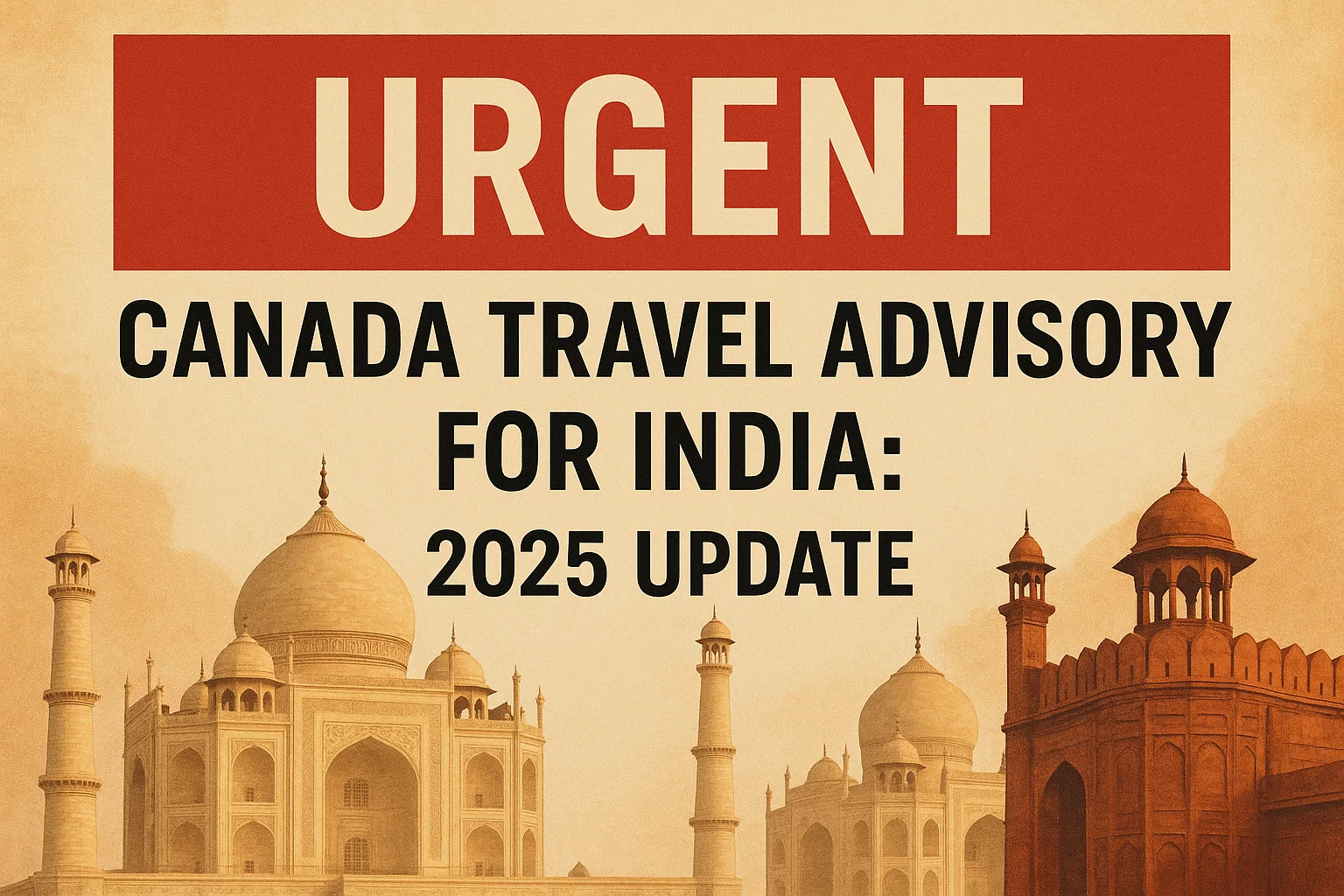Urgent Canada Travel Advisory for India: 2025 Update
Canada issues high-alert Canada travel advisory for India: what travellers must know
The relationship between India and Canada has taken a significant turn with Canada’s latest high-alert travel advisory, fundamentally impacting how citizens from both nations approach travel between these two countries. This comprehensive advisory, issued by the Government of Canada, has raised serious concerns for anyone planning travel to India or considering travel to Canada from Indian territories.
Understanding the implications of this advisory is crucial for travelers, especially those navigating visa Canada requirements or planning tourism between these nations. Whether you’re an Indian citizen seeking a Canada tourist visa from India or a Canadian planning to visit India, this advisory changes the travel world significantly.
Key takeaways for travelers:
- Verify current advisory status before any travel planning
- Ensure all visa canada or india visa documentation is current and complete
- Avoid restricted territories and maintain situational awareness
- Register with appropriate embassy services when possible
- Consider travel insurance and flexible booking options
Table of Contents
Understanding Canada’s High-Alert Travel Advisory
Comprehensive Warning for Indian Territories
The Government of Canada has issued an unprecedented travel advisory urging Canadians to exercise extreme caution when planning travel to India. This advisory goes beyond routine travel warnings, specifically targeting regions with heightened security risks including Jammu and Kashmir, Assam, and Manipur.
The advisory explicitly states: “Avoid all travel to the Union Territory of Jammu and Kashmir due to the unpredictable security situation.“ This stark warning encompasses threats from terrorism, militancy, civil unrest, and kidnapping, making it clear that Canada travel officials consider these areas extremely dangerous for their citizens.
Specific Regional Restrictions
The advisory identifies several high-risk zones that directly impact travel planning:
- Complete travel ban: Jammu and Kashmir (excluding Ladakh)
- Non-essential travel discouraged: Assam and Manipur
- Border restrictions: Areas within 10km of the Pakistan border in Gujarat, Punjab, and Rajasthan
- Closed crossing: Attari-Wagah border crossing remains indefinitely closed
These restrictions significantly affect those holding a visa for Canada from India or Indians with travel visa canada documentation who may need to transit through these regions.
Impact on Canada-India Travel Relations

Diplomatic Tensions and Travel Disruptions
The advisory comes amid escalating diplomatic tensions between India and Canada, which have created an atmosphere of uncertainty for travelers from both nations. Recent military actions and travel disruptions have particularly affected flights in northern and western India, creating additional challenges for those with canada tourist visa requirements or those seeking visa india documentation.
Canadian officials have specifically warned about potential anti-Canada protests, advising their citizens to maintain a low profile, avoid crowds, and remain vigilant, particularly in Delhi. This heightened alert status affects not only tourism but also business travel and family visits between the two nations.
Implications for Indian Travelers to Canada
For Indian citizens planning travel to canada, this advisory creates a complex situation. While the advisory primarily concerns Canadians traveling to India, the diplomatic tensions underlying these warnings may impact canada visa application processes and canada visa requirements for Indian applicants.
Those seeking a travel visa for canada from india should be prepared for potentially increased scrutiny and longer processing times. The canada embassy services have already been affected, with consular services currently unavailable in Bengaluru, Chandigarh, and Mumbai.
Visa and Immigration Implications
Current Visa Requirements and Restrictions
Despite the travel advisory, standard visa requirements remain in effect for both nations. Canadian travelers must still obtain proper india visa from canada documentation, while Indian citizens continue to need appropriate canada tourist visa approvals for their journeys.
India tourist visa requirements for Canadians include:
- Passport validity of at least six months
- Two blank pages in the passport
- Maximum stay of 180 consecutive days for tourist visas
- Mandatory FRRO registration for extended stays
Canada Visa Requirements for Indian Citizens
Indian travelers seeking india to travel to Canada must navigate standard travel visa canada requirements, which include:
- Valid passport with appropriate validity period
- Completed canada visa application with supporting documents
- Proof of financial support and travel purpose
- Medical examinations if required
- Biometric data collection
The current diplomatic situation may result in additional documentation requirements or extended processing times for travel visa applications between the two countries.
Travel Safety and Alternative Planning

Essential Safety Measures for Travelers
Given the current advisory status, travelers planning journeys between india canada destinations must prioritize safety and preparedness. The Canadian government recommends several critical safety measures:
For Canadians in India:
- Maintain low visibility and avoid large gatherings
- Stay informed about local security situations
- Register with Canadian consular services where available
- Avoid restricted border areas and conflict zones
- Keep emergency contact information readily accessible
For Indians planning Canada travel:
- Verify current canada tourist visa requirements before applying
- Consider alternative travel dates if diplomatic tensions escalate
- Maintain comprehensive travel insurance
- Stay updated on embassy service availability
Alternative Routes and Planning Strategies
The closure of the Attari-Wagah border crossing and restrictions in northern regions require travelers to consider alternative routes and timing. Those with india travel visa documentation should:
- Plan routes avoiding restricted territories
- Allow extra time for security checks and potential delays
- Consider flying rather than overland travel where possible
- Verify transit requirements through third countries if necessary
Embassy Services and Consular Support
Current Service Limitations
The travel advisory has directly impacted consular services, with significant limitations affecting both visa india and canada visa processing capabilities. Currently:
Suspended Services:
- Bengaluru consular office
- Chandigarh consular office
- Mumbai consular office
Active Services:
- High Commission of Canada in New Delhi
- Ottawa’s Emergency Watch and Response Centre
- Limited emergency consular assistance
Accessing Embassy Support
Travelers requiring tourist visa india from canada services or emergency assistance should contact:
- The Canadian High Commission in New Delhi for in-person services
- Ottawa’s Emergency Watch and Response Centre for 24/7 assistance
- Local Canadian honorary consuls where available
Indian citizens seeking travel visa for canada from india services should verify current embassy operations and processing capabilities before submitting applications.
Long-term Implications for Bilateral Travel
Economic and Tourism Impact
The travel advisory significantly impacts the thriving tourism sector between india and canada. The restriction affects not only leisure canada tourist visits but also business travel, educational exchanges, and family reunification trips.
Tourism operators, airlines, and hospitality sectors in both countries face uncertainty as travelers postpone or cancel planned journeys. The canada tourist visa from india application numbers may decline as potential visitors reassess travel safety and necessity.
Future Travel Outlook
The duration and scope of these travel restrictions remain unclear, depending largely on diplomatic developments between the two nations. Travelers should:
- Monitor government advisories regularly for updates
- Maintain flexibility in travel planning
- Consider trip cancellation insurance for existing bookings
- Stay informed about diplomatic developments that might affect travel policies
Conclusion and Recommendations for Travelers
The Canada travel advisory for India represents a significant shift in bilateral travel relations, requiring both nations’ citizens to approach cross-border travel with heightened caution and preparation. Whether you’re pursuing travel to canada from India or planning travel to india from Canada, understanding these restrictions is essential for safe and successful journeys.
Immediate action items:
- Check embassy websites for the latest service availability
- Review existing travel bookings for affected regions
- Update emergency contact information with relevant authorities
- Consider postponing non-essential travel until conditions improve
As diplomatic relations evolve, travelers must stay informed and adaptable. The safety and security measures outlined in this advisory, while restrictive, aim to protect citizens from both nations during this period of heightened tension.
For the most current information on travel visa canada requirements, canada visa application processes, or india travel visa updates, consult official government sources and registered immigration consultants. The situation remains fluid, and professional guidance can help navigate these complex travel requirements safely and legally.

